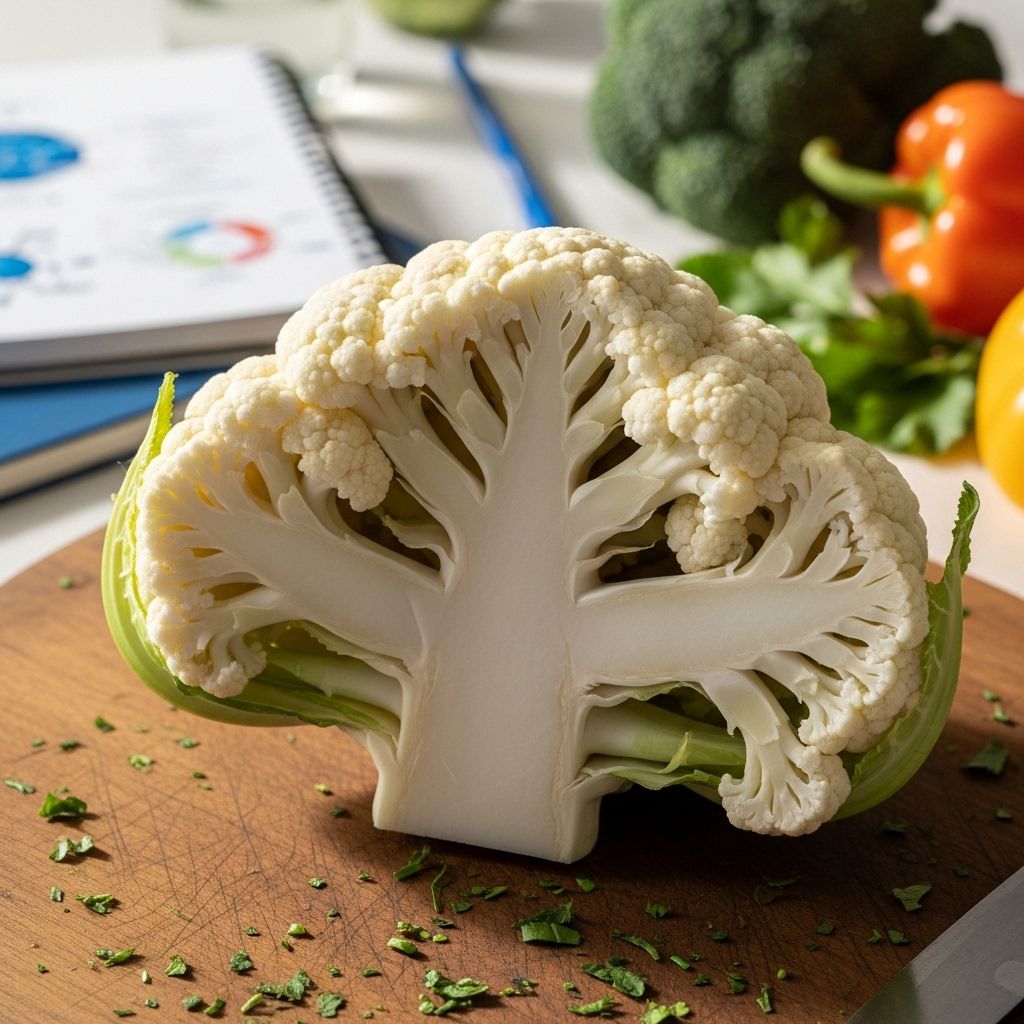Top 10 Health Benefits of Cauliflower: Nutrition, Wellness, and More
A versatile cruciferous powerhouse that supports wellness from head to toe.

Top 10 Health Benefits of Cauliflower
Cauliflower, a cruciferous vegetable cherished for its culinary versatility and mild flavor, is a treasure trove of nutrients and natural compounds that benefit health in a wide variety of ways. From protecting against chronic diseases to supporting brain health, discover the science-backed reasons to add cauliflower to your plate.
What is Cauliflower?
Belonging to the Brassica oleracea family alongside broccoli, kale, and Brussels sprouts, cauliflower boasts a dense nutritional profile and is widely used in global cuisines. Its white florets, edible stems, and even leaves provide a range of textures and flavors suitable for roasting, mashing, salads, or as a low-carb substitute for grains.
Cauliflower Nutritional Profile
- Calories: ~28 kcal per cup (raw)
- Water: Over 90%
- Fiber: 2–3 grams per cup
- Vitamin C: ~77% of daily value per cup
- Vitamins B5, B6, B9 (folate), and K
- Phytonutrients: Glucosinolates, isothiocyanates, indoles
- Choline: About 10% of daily value per cup
- Minerals: Calcium, magnesium, potassium
1. Rich Source of Antioxidants
Cauliflower is packed with antioxidants that protect the body from oxidative stress caused by free radicals, which can otherwise damage cells and lead to chronic diseases. Key antioxidants in cauliflower include glucosinolates and isothiocyanates, which research suggests may slow the growth of abnormal cells and lower inflammation. These compounds help reduce risk factors for various conditions, including certain cancers and heart disease .
- Vitamin C: Supports the immune system and acts as a potent free radical scavenger.
- Carotenoids and flavonoids: Also present in small amounts, these phytonutrients add to cauliflower’s antioxidant capacity.
2. May Reduce Risk of Cancer
Cruciferous vegetables like cauliflower have been heavily studied for cancer prevention. Compounds such as indole-3-carbinol and sulforaphane in cauliflower facilitate the detoxification of potential carcinogens and may inhibit tumor growth. Studies in both laboratory and animal settings indicate these antioxidants suppress cancer progression by blocking procarcinogens and promoting the self-destruction of abnormal cells . Human research remains ongoing, but increased consumption of cruciferous vegetables has been linked to a lower incidence of cancers such as breast, colon, and prostate.
- Indole-3-carbinol: May help regulate healthy hormone levels, reducing risk for hormone-dependent cancers.
- Sulforaphane: Research indicates it inhibits enzymes that turn inactive carcinogens into active ones, helping to prevent tumor initiation.
3. Supports Heart Health
Cauliflower supports cardiovascular well-being through its high fiber, antioxidant, and anti-inflammatory content. Dietary fiber helps regulate cholesterol levels, while sulforaphane and other antioxidants protect blood vessels and may reduce blood pressure. A choline-rich diet, such as one that includes cauliflower, also supports arterial health .
- Helps clear arteries by lowering LDL (bad cholesterol)
- Reduces arterial stiffness, which supports normal blood pressure
- Antioxidants decrease inflammation that contributes to vascular disease
4. Aids Digestion and Promotes Gut Health
High fiber content in cauliflower helps maintain regular digestion and a healthy gut environment. Fiber not only aids waste elimination but also promotes the growth of beneficial gut bacteria, which lower inflammation and contribute to overall immune function. Consuming adequate fiber from vegetables like cauliflower is associated with reduced risk of gastrointestinal disorders, including constipation, diverticulitis, and colon cancer .
- Dietary fiber increases stool bulk and softness
- Supports colon health and regularity
5. Good for Weight Loss and Management
With its low calorie and carbohydrate content, yet high fiber and water makeup, cauliflower is an excellent food for weight loss. It provides fullness with fewer calories, making it a valuable alternative to starchy foods like rice or potatoes. Its versatility enables diverse, satisfying meal options without excessive calories or carbs .
- Fills you up, helping control appetite
- Can be substituted for higher-calorie grains in recipes
- Hydration from water content supports metabolism and satiety
6. Rich in Choline for Brain and Liver Health
Choline is a nutrient critical for brain development, neurotransmitter synthesis, memory, mood, and muscle control. Cauliflower is an excellent plant-based source, offering roughly 10% of the adult daily requirement per cup. Most people do not consume enough choline, which can lead to cognitive decline over time and increased risk of liver disease. Increased choline intake supports memory, learning, and may help protect against age-related neurodegeneration .
- Essential for acetylcholine (a neurotransmitter involved in memory and mood regulation)
- Needed for proper fat metabolism and prevention of fatty liver
7. Strengthens Bones
Cauliflower contains vitamin K and other minerals that play a role in bone health. Vitamin K is essential for the production of proteins necessary for bone mineralization and proper calcium utilization. Sufficient vitamin K intake is associated with reduced risk of osteoporosis and bone fractures, especially in older adults .
- Promotes bone mineral density
- Facilitates calcium transport and binding in the skeleton
8. Boosts Immunity
With its high vitamin C and antioxidant content, cauliflower enhances immune function by mobilizing immune cells and assisting with pathogen defense. Vitamin C’s role in collagen synthesis also supports skin and mucosal health, providing a barrier against infections .
- Stimulates production and activity of white blood cells
- Antioxidants reduce inflammation and bolster the body’s defenses
9. Detoxifies and Promotes Liver Health
The phytonutrients in cauliflower, including glucosinolates, indoles, and sulforaphane, help stimulate enzymes in the liver that break down and neutralize potentially harmful compounds, such as carcinogens and environmental toxins. This detoxification process protects cells from damage and supports overall metabolic health .
- Supports phase II liver detoxification enzymes
- Facilitates elimination of heavy metals and persistent toxins
10. Promotes Healthy Pregnancy
Folate (vitamin B9) is abundant in cauliflower and is vital for fetal growth and development. Folate reduces the risk of neural tube defects during pregnancy and supports the formation of healthy DNA and red blood cells throughout life .
- Crucial for cell growth and division in developing fetuses
- May reduce risk of certain birth defects
Table: Cauliflower Health Benefits At a Glance
| Health Benefit | Key Compounds | Main Outcomes |
|---|---|---|
| Antioxidant defense | Vitamin C, glucosinolates, isothiocyanates | Protects cells from oxidative damage |
| Cancer prevention | Sulforaphane, indole-3-carbinol | Inhibits tumor growth and carcinogen activation |
| Heart health | Fiber, sulforaphane | Reduces cholesterol and blood pressure |
| Brain/liver health | Choline | Supports neurotransmitters, prevents fatty liver |
| Digestive wellness | Fiber | Enhances gut health and regularity |
| Immunity | Vitamin C, antioxidants | Boosts immune cell function |
| Bone strength | Vitamin K, minerals | Supports bone density and strength |
| Detoxification | Glucosinolates, indoles | Facilitates liver detox enzyme activity |
| Healthy pregnancy | Folate | Supports fetal development |
| Weight management | Fiber, water | Promotes satiety and low caloric intake |
How to Include Cauliflower in Your Diet
- Raw in salads: Adds crunch and nutrition to mixed salads.
- Steamed or roasted: Enhances flavor and preserves nutrients.
- Cauliflower rice: Low-carb, grain-free substitute for regular rice in stir-fries and bowls.
- Cauliflower mash: Creamy, fiber-rich alternative to mashed potatoes.
- Soups: Creates a velvety, nutrient-packed base.
- Pizza crusts and wraps: Popular for gluten-free, plant-based recipes.
Tips for Maximizing Cauliflower’s Benefits
- Enjoy a variety of colorful cauliflower types, including purple and orange, for additional phytonutrients.
- Lightly cook or steam to preserve the highest level of vitamins and antioxidants.
- Store florets in an airtight container in the refrigerator to maintain freshness for up to five days.
Frequently Asked Questions (FAQs)
Is cauliflower good for a low-carb or ketogenic diet?
Yes. With low carbohydrate content and the ability to mimic grains like rice or mashed potatoes, cauliflower is ideal for both low-carb and ketogenic eating plans.
Are there any side effects of eating cauliflower?
Cauliflower is generally safe for most people, but some may experience bloating or gas due to its fiber and sulfur-containing compounds. Gradually increasing intake and proper cooking can reduce digestive discomfort.
Does cooking destroy cauliflower’s nutrients?
Some water-soluble nutrients (like vitamin C) may diminish with prolonged boiling. Steaming, microwaving, or roasting are better for retaining nutrients, and light cooking may even enhance the availability of some antioxidants.
Can cauliflower help with detoxification?
Yes, the glucosinolates, indoles, and sulforaphane in cauliflower activate liver detox enzymes that help neutralize toxins and facilitate their removal from the body.
Who should avoid cauliflower?
People with certain thyroid conditions should consult a healthcare provider, as excessive intake of raw cruciferous vegetables may affect thyroid function due to compounds called goitrogens. For most people, moderate consumption poses no risk.
Conclusion
Cauliflower’s nutritional versatility and robust profile of beneficial compounds make it a superfood worth adding to your daily menu. From disease protection and weight management to brain, heart, and digestive health, this humble vegetable delivers a host of wellness benefits in every bite. By exploring creative recipes and enjoying cauliflower in multiple forms, you can experience its full spectrum of nutrition and flavor.
References
- https://www.webmd.com/food-recipes/health-benefits-cauliflower
- https://ackermancancercenter.com/cauliflower/
- https://aanmc.org/naturopathic-kitchen/cauliflower/
- https://www.aicr.org/cancer-prevention/food-facts/cauliflower-full-of-vitamin-c-and-health-protective-compounds/
- https://health.clevelandclinic.org/cauliflower-benefits
- https://pmc.ncbi.nlm.nih.gov/articles/PMC3793502/
- https://www.mayoclinichealthsystem.org/hometown-health/speaking-of-health/cauliflower-the-new-nutrition-superstar
- https://pmc.ncbi.nlm.nih.gov/articles/PMC8533432/
Read full bio of Sneha Tete









